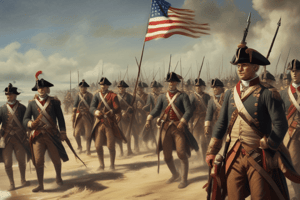Podcast
Questions and Answers
Who pursued the fleeing British soldiers after the successful Battle of Princeton?
Who pursued the fleeing British soldiers after the successful Battle of Princeton?
- The British regulars
- The New Jersey militia
- The Continental Army (correct)
- The American Patriots
Where did Alexander Hamilton fire shots, according to legend, after the Battle of Princeton?
Where did Alexander Hamilton fire shots, according to legend, after the Battle of Princeton?
- Morristown
- Nassau Hall (correct)
- Princeton University
- New Brunswick
What did Washington do to avoid a retreat after the Battle of Princeton?
What did Washington do to avoid a retreat after the Battle of Princeton?
- He ordered a retreat to New Brunswick
- He abandoned his posts in New Jersey
- He launched a flank march (correct)
- He pursued the fleeing British soldiers
Where did Cornwallis order his army to retreat after the Battle of Princeton?
Where did Cornwallis order his army to retreat after the Battle of Princeton?
Who were not supposed to be able to hold their own against the British regulars in pitched battle?
Who were not supposed to be able to hold their own against the British regulars in pitched battle?
Study Notes
- General George Washington led a surprise attack on Trenton's Hessian garrison on December 26, 1776, after crossing the Delaware River on Christmas Day.
- The successful attack enabled the Continental Army to secure food and supplies, allowing them to maintain momentum in the Revolutionary War.
- In response to the loss in Trenton, British General Cornwallis marched towards Trenton with nearly 8,000 men, intending to deliver a final blow on January 3, 1777.
- Washington and his troops, numbering around 6,000, were filled with dread as they faced the possibility of being overwhelmed by Cornwallis' reinforcements. Term: Assunpink Creek
- Washington and his officers decided to launch a bold and dangerous plan - a night march to attack the British positions in Princeton at dawn on January 3, 1777.
- Washington kept behind about 500 men to tend to the camp fires, tricking Cornwallis' troops into believing they were digging in for a battle the next day at Assunpink Creek.
- British Lieutenant Colonel Charles Mawhood and his troops were also marching, but in the opposite direction, intending to reinforce General Lord Cornwallis at Trenton.
- As they marched south, Mawhood's troops encountered Washington's Continental Army getting closer to the Princeton garrison, leading to a surprising battle.
- Washington stepped in to lead a counterattack against Mawhood's troops and, with the help of Joseph Moulder's artillery, broke the British line.
- The Continental Army pursued the fleeing British soldiers, with some of them not stopping until they reached today's Princeton University, then known as Nassau Hall.
- Alexander Hamilton, a young artillery captain at the time, fired shots into Nassau Hall, and according to legend, one of those shots landed directly on the portrait of King George, causing the British to surrender.
- Washington's successful Battle of Princeton is remembered as one of the great flank marches in American history, as he avoided a retreat by going on the offensive.
- After the battle, Cornwallis abandoned many of his posts in New Jersey and ordered his army to retreat to New Brunswick. Washington moved his troops to Morristown, NJ.
- The British were not able to stand up to the American Patriots, who were not supposed to be able to hold their own against the British regulars in pitched battle.
- The war was not expected to end anytime soon, as long as General Washington was in charge of the Continental Army.
Studying That Suits You
Use AI to generate personalized quizzes and flashcards to suit your learning preferences.
Description
Test your knowledge about the successful surprise attack led by General George Washington on the British garrison in Princeton, as well as the events leading up to and following the battle during the Revolutionary War.




